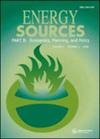Economic complexity–carbonization nexus in the European Union: A heterogeneous panel data analysis
IF 2.2
4区 工程技术
Q3 ENERGY & FUELS
Energy Sources Part B-Economics Planning and Policy
Pub Date : 2022-03-02
DOI:10.1080/15567249.2022.2046210
引用次数: 4
Abstract
ABSTRACT The economic contributions of economic complexity, characterized by knowledge, sophistication, and diversification, are well documented. However, its decarbonization impacts remain unclear and need more research, especially in complex economies. Therefore, this study tests the economic complexity effects on carbon dioxide (CO2) productivity (output per emissions) and CO2 intensity (emissions per capita) for 22 European Union countries from 1995 to 2018. The study follows a cointegration framework considering heterogeneity and cross-country dependence diagnostics. Augmented mean group estimates confirm that higher economic complexity reduces CO2 productivity and increases CO2 intensity. Additionally, energy efficiency (output per energy supply) improvement is found as a key driver of decarbonization. Higher per capita income intensifies emissions, but non-linear income effects do not reveal an environmental Kuznets curve pattern. Deindustrialization improves decarbonization, while environmental tax revenues have insignificant influences. A bidirectional causality is established between CO2 intensity and economic complexity. Overall evidence suggests policies favoring energy-efficient green complexity.欧盟经济复杂性-碳化关系:异质面板数据分析
以知识、复杂和多样化为特征的经济复杂性对经济的贡献是有据可稽的。然而,其脱碳影响尚不清楚,需要更多的研究,特别是在复杂的经济体中。因此,本研究对1995年至2018年22个欧盟国家的经济复杂性对二氧化碳(CO2)生产率(每次排放的产出)和二氧化碳强度(人均排放量)的影响进行了测试。该研究遵循协整框架,考虑异质性和跨国依赖诊断。增广平均群估计证实,较高的经济复杂性降低了二氧化碳生产率并增加了二氧化碳强度。此外,能源效率(每能源供应的产出)的提高被认为是脱碳的关键驱动因素。较高的人均收入加剧了排放,但非线性收入效应并未显示出环境库兹涅茨曲线模式。去工业化对脱碳有促进作用,而环境税收对脱碳影响不显著。在二氧化碳强度和经济复杂性之间建立了双向因果关系。总体证据表明,政策倾向于节能的绿色复杂性。
本文章由计算机程序翻译,如有差异,请以英文原文为准。
求助全文
约1分钟内获得全文
求助全文
来源期刊

Energy Sources Part B-Economics Planning and Policy
ENERGY & FUELS-
CiteScore
6.80
自引率
12.80%
发文量
42
审稿时长
6-12 weeks
期刊介绍:
12 issues per year
Abstracted and/or indexed in: Applied Science & Technology Index; API Abstracts/Literature; Automatic Subject Index Citation; BIOSIS Previews; Cabell’s Directory of Publishing Opportunities in Economics and Finance; Chemical Abstracts; CSA Aquatic Science & Fisheries Abstracts; CSA Environmental Sciences & Pollution Management Database; CSA Pollution Abstracts; Current Contents/Engineering, Technology & Applied Sciences; Directory of Industry Data Sources; Economic Abstracts; Electrical and Electronics Abstracts; Energy Information Abstracts; Energy Research Abstracts; Engineering Index Monthly; Environmental Abstracts; Environmental Periodicals Bibliography (EPB); International Abstracts in Operations Research; Operations/Research/Management Science Abstracts; Petroleum Abstracts; Physikalische Berichte; and Science Citation Index.
Taylor & Francis make every effort to ensure the accuracy of all the information (the "Content") contained in our publications. However, Taylor & Francis, our agents, and our licensors make no representations or warranties whatsoever as to the accuracy, completeness, or suitability for any purpose of the Content. Any opinions and views expressed in this publication are the opinions and views of the authors, and are not the views of or endorsed by Taylor & Francis. The accuracy of the Content should not be relied upon and should be independently verified with primary sources of information. Taylor & Francis shall not be liable for any losses, actions, claims, proceedings, demands, costs, expenses, damages, and other liabilities whatsoever or howsoever caused arising directly or indirectly in connection with, in relation to, or arising out of the use of the Content. Terms & Conditions of access and use can be found at http://www.tandfonline.com/page/terms-and-conditions .
 求助内容:
求助内容: 应助结果提醒方式:
应助结果提醒方式:


